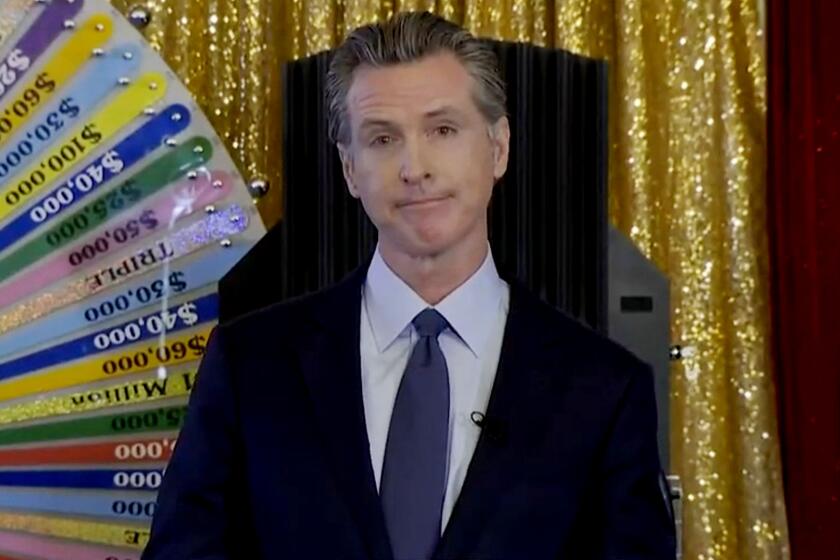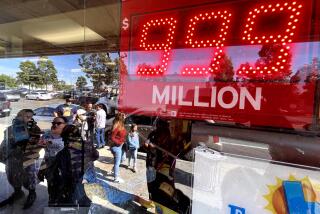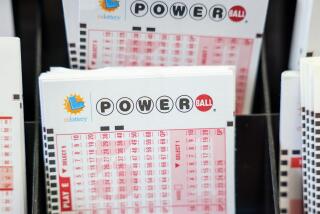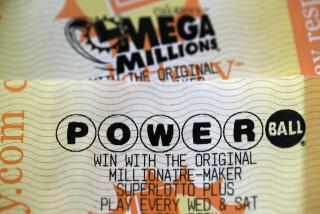Commentary: Gavin Newsom’s wheel of vaccine fortune: When a game show is as good a metaphor as any
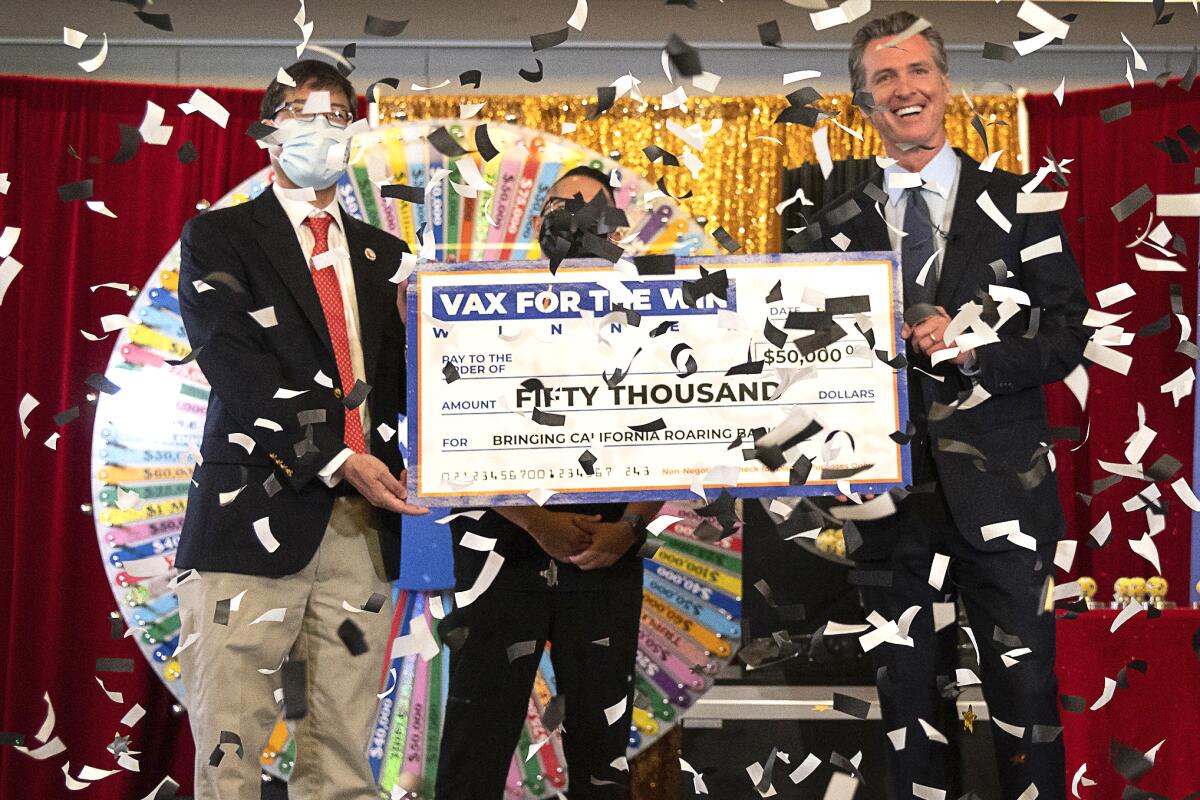
Our perceptions of risk, as many insurance adjusters and sports teams with comfortable leads know, could be better. Academics study this. For a 2013 Assn. for Psychological Science paper, 101 college students, in exchange for extra credit, were placed in a room with a tarantula (American research universities are the envy of the world) and tried to guess how far away the spider was. The students who were afraid thought the spider was much closer. Fear messes with our perceptions.
On the other hand, one of the most terrifying sentences you will ever read appears in an academic synopsis for a 2011 Current Biology article, which concluded that humans “exhibit a pervasive and surprising bias: when it comes to predicting what will happen to us tomorrow, next week, or fifty years from now, we overestimate the likelihood of positive events, and underestimate the likelihood of negative events.” The risk of divorce, car accidents, getting cancer, our life expectancies, our career success, how smart our kids are — you know what? Maybe it’s better not to think about it. As George Orwell put it, “Most people get a fair amount of fun out of their lives, but on balance life is suffering, and only the very young or the very foolish imagine otherwise.”
So as this awful COVID-19 pandemic crawls to its conclusion, perhaps there is no better symbol for our maladjustment than Democratic California Gov. Gavin Newsom standing in front of a lotto ball dispenser and a prize wheel Friday at the headquarters of the California State Lottery to talk about handing out $50,000 cash prizes to random state residents who get vaccinated. “We’re here with their expertise, borrowing some of their equipment,” Newsom said of State Lottery officials, carefully noting that the so-called Vax for the Win was not an official lottery program, presumably for a good legal reason. The real money, the cash prizes of $1.5 million, are still to come. But at this press conference, it was the wheel of fortune that draws the eye.
The balance of pain and prosperity is an ancient one, represented often by the wheel. The lyrics in Carl Orff’s “Carmina Burana” moan that “the wheel of Fortune turns: I go down, demeaned; another is raised up; far too high up sits the king at the summit — let him fear ruin!” Though it’s more likely the king at the summit has optimism bias.
Gov. Gavin Newsom, facing a recall election, draws the names of the first winners of California’s COVID-19 vaccine lottery in an upbeat event.
The idea of the vaccine prize lottery — designed to entice the vaccine-hesitant to get poked — emerged from the administration of Republican Ohio Gov. Mike DeWine, and the only thing more notable than some of the scoffing is the fact that the whole concept seems to be working really well. Vaccination rates have picked up in the Buckeye State. “The rest of us assumed that reason, science, and study would eventually carry the day,” the Cleveland Scene alt-weekly concluded. “We were morons. DeWine held a keener grasp of human nature.”
And why not? We live in a lottery reality, whose probabilities and outcomes in some fields right now seem influenced occasionally by actual material conditions, but sometimes more often by whether people think the vibes feel good or very, very bad.
The meme-hyped stock for the struggling movie theater chain AMC is one of the hottest things out there, for some reason, leading Bloomberg financial writer Matt Levine to conclude this week that “the way to understand AMC is to abandon your conscious mind for a while and just float on a sea of vague associations.”
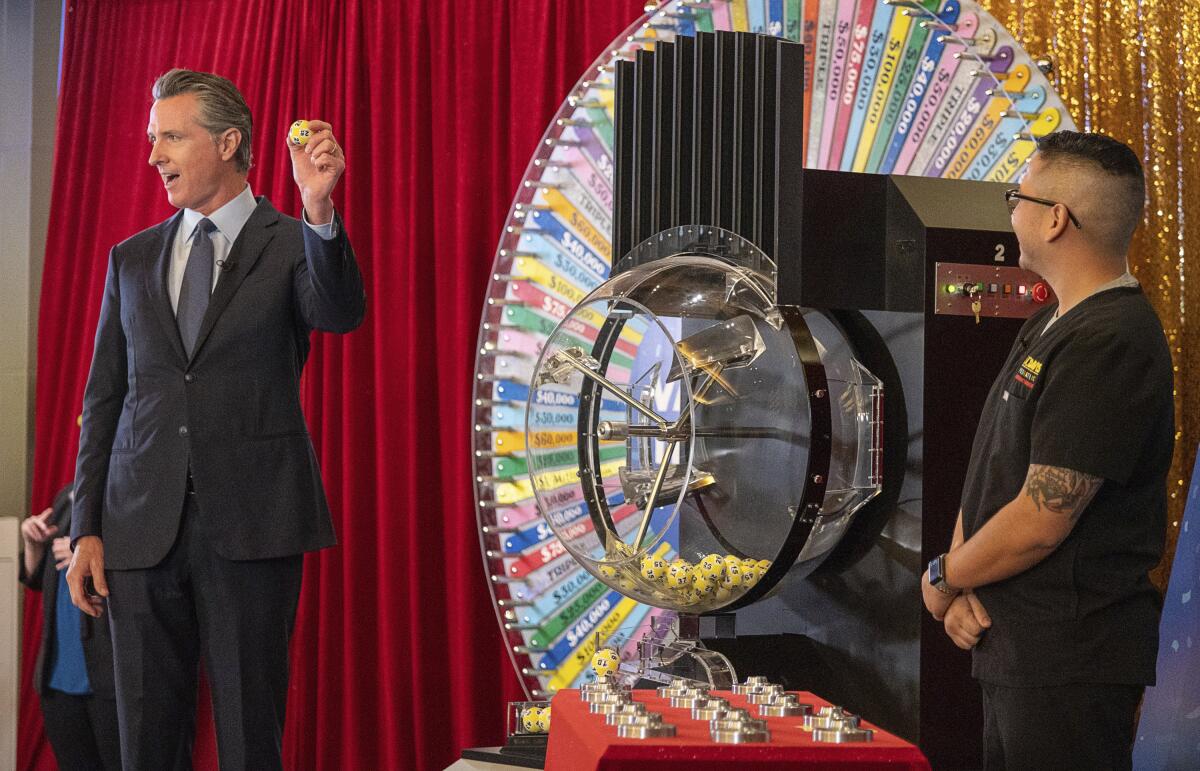
The coronavirus ... seemed to operate with a similar lottery-ball marriage to chaos and misfortune. ... Many Americans will never understand how or where they contracted the world’s most famous illness.
Whether people understand what’s happening seems irrelevant to whether they’re getting famous on TikTok, or making lots of money or suddenly losing it on some cryptocurrency you’ve never heard of. You can be fortune’s fool or have a fool’s fortune.
The current official use of the lottery seems biased toward the elective — toward the nice — by historical standards. Older Americans remember one of the country’s previous uses of lotteries as public policy, selective service, to choose which young people would kill and die in Vietnam. One World War II soldier reportedly won a “Why I’m Fighting” essay contest with the answer, “I was drafted.”
At the time, in the days before all-volunteer service, in eras of mass death, it must have felt fairer to pick men at random if anyone had to be picked at all. In some ancient depictions of Fortuna, the Roman goddess of fortune, she wore a blindfold, like Lady Justice.
The coronavirus, especially in the early days, seemed to operate with a similar lottery-ball marriage to chaos and misfortune. How the virus even traveled was poorly understood for a great deal of time, leading to infection that felt nearly random. Many Americans will never understand how or where they contracted the world’s most famous illness, if they were symptomatic and aware of their infection at all. Acute illness became a similar biological game of chance in which many of the hundreds of millions of infected would basically turn out fine, while an overwhelming fraction were felled horrifically.
It was a major scientific and political struggle — the world’s biggest tarantula distance experiment — to figure out how scared, or not scared, or kind of scared, people should be. Many people, in the din of voices of experts and objectors, got through it by gut feeling. So maybe some optimism bias, the hope for the wonderfully improbable, is just what the doctor ordered.
“Each one of these balls represents a $50,000 check that an individual will receive — when they get their second shot,” Newsom said, as he waited to call the winners Friday, adding gravely, “There’s always stipulations.”
He then reached down to pick up the first ball, ready to announce whose life was going to change.
More to Read
The biggest entertainment stories
Get our big stories about Hollywood, film, television, music, arts, culture and more right in your inbox as soon as they publish.
You may occasionally receive promotional content from the Los Angeles Times.
